Search for topics or resources
Enter your search below and hit enter or click the search icon.
May 23rd, 2013 | 6 min read
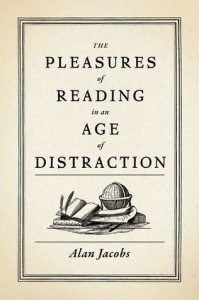
It’s late May, which means that across the world, twentysomething college students are graduating or preparing to graduate: departing campuses and communities that have shaped them deeply and venturing off into the wide open spaces of adulthood in a way that is (for most of them) wholly new. The transition from college to post-college life is a significant one for many reasons, not least of which is the fact that for many college grads, being a student (that is: being forced to read things, write papers and take exams for coveted grades) is all they have known for the last 17 or so years.
For many of them, “learning” has largely been something they associate with pressure, stress, and the confines of parental control and expectation. Education is something that has been prescribed, mapped out and scheduled-to-death for them as long as they can remember. To graduate from college, then, is among other things to liberate oneself from the notion of education as bureaucracy (curriculum checklists, units, requirements, pre-reqs, to-dos, tuition payments, etc.) and to replace it with a notion of education as a choice, or (even better) education as a pleasure. That is, if it is replaced at all.
The sad reality, I suspect, is that after degrees are conferred, many graduates consider their education to be concluded. Which I guess is the expected conclusion to an educational system primarily built around preparing students for the next thing, culminating in a college degree that translates into a job. If the telos of education is practical preparation as opposed to, say, the seeking of truth and the ability to ask questions well, then of course it makes sense that once a job is attained or a lucrative skill mastered, education ceases to be a priority.
But practical training and skill development are only part of education’s purpose. Degrees are not the end goal. Education should be a lifelong pursuit. To exist is to always be on a continuum of known and unknown, discovered and undiscovered. “We shall not cease from exploration,” wrote T.S. Eliot.
That’s why, if I were to give one piece of advice to college graduates, it would be to find ways to keep the pursuit of knowledge and truth an active and lively pursuit in your life. One way to do that is to keep reading. Embrace the fact that, for the first time in many years, you can read what you want to and you won’t have to take a test or write a term paper about it. Learn to take pleasure in it. Make it a daily habit. Reading for “fun” is one of the most important things one can do to stay motivated to keep learning.
Read anything. Blogs, newspapers, magazines, tweets, billboards, poems (please read poems!), essays, journals, Wikipedia, and so on. Also, watch movies. Documentaries. Blockbusters. TV. Go to concerts. Museums. Take walks. Run. Travel. Try new restaurants. Develop an expertise or a habit. Discuss current events. Debate a friend. Sit on your front porch smoking pipes while discussing theology (or drinking scotch while discussing politics). Do any and everything you need to do in order to grow in your curiousity about the world and your desire to understand it more deeply.
Oh, and keep reading books.
On that note, I thought I’d give a few recommendations. The following are five books that have either come out recently or will be released very soon. They are books that I think are particularly inspiring and motivating for those of us who may be in a transition moment in life but still doggedly in pursuit of the good life: living, growing, thinking, believing and questioning well.
The Pleasures of Reading in an Age of Distraction (2011), by Alan Jacobs
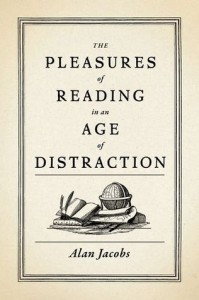 I can’t think of a better book to recommend to a graduate as a first venture into the world of post-college reading. Jacobs dispels the notion that reading should be a chore, or that only highbrow Great Books are worth our time. “Read what gives you delight--at least most of the time--and do so without shame,” he argues, making the case in characteristically elegant fashion that reading can and should be something that gives us pleasure. Happily, Jacobs' own finesse and wit as a writer makes the book itself a pleasure to read.
I can’t think of a better book to recommend to a graduate as a first venture into the world of post-college reading. Jacobs dispels the notion that reading should be a chore, or that only highbrow Great Books are worth our time. “Read what gives you delight--at least most of the time--and do so without shame,” he argues, making the case in characteristically elegant fashion that reading can and should be something that gives us pleasure. Happily, Jacobs' own finesse and wit as a writer makes the book itself a pleasure to read.
Present Shock: When Everything Happens Now (2013), by Douglas Rushkoff
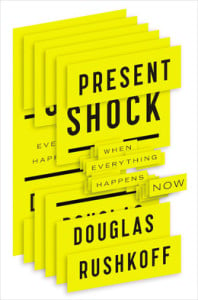 I recommend this book as a companion piece of sorts to Jacobs’ book, with emphasis on the “age of distraction” part. Rushkoff--the media theorist guru behind the Frontline documentaries Merchants of Cool and The Persuaders--more or less attempts to connect every zeitgeist-defining thing in our world today (Instagram! Zombies! Tea Partiers!) to shape a unifying theory about how we are both more and less “present” than ever. Obvious at times but mostly quite insightful, Present Shock is the sort of “magnifying glass on your world” book that is important to read every so often because it thinks deeply and critically about contemporary life and, in turn, helps the reader to do the same.
I recommend this book as a companion piece of sorts to Jacobs’ book, with emphasis on the “age of distraction” part. Rushkoff--the media theorist guru behind the Frontline documentaries Merchants of Cool and The Persuaders--more or less attempts to connect every zeitgeist-defining thing in our world today (Instagram! Zombies! Tea Partiers!) to shape a unifying theory about how we are both more and less “present” than ever. Obvious at times but mostly quite insightful, Present Shock is the sort of “magnifying glass on your world” book that is important to read every so often because it thinks deeply and critically about contemporary life and, in turn, helps the reader to do the same.
When I Was a Child I Read Books: Essays (2012), by Marilynne Robinson
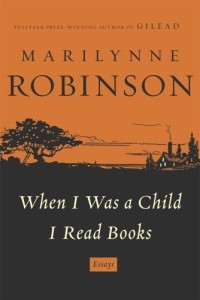 Marilynne Robinson is my favorite public intellectual. She has that rare, C.S. Lewis-style combination of being both a winsome communicator and an intellectual heavy-hitter. She knows a lot about a lot of things, and can write better than just about any other living writer, in both nonfiction and fiction (read her Pulitzer Prize-winning Gilead for proof). She is awesome, and her most recent essay collection is too. When I Was a Child I Read Books is not easy reading, to be sure. It’s challenging. But it will inspire you to want to think as broadly and as deeply as she does about a vast array of things: religion, contemporary economics, “new atheists,” science, literature, geography, Moses, hymnology, and yes, childhood reading habits.
Marilynne Robinson is my favorite public intellectual. She has that rare, C.S. Lewis-style combination of being both a winsome communicator and an intellectual heavy-hitter. She knows a lot about a lot of things, and can write better than just about any other living writer, in both nonfiction and fiction (read her Pulitzer Prize-winning Gilead for proof). She is awesome, and her most recent essay collection is too. When I Was a Child I Read Books is not easy reading, to be sure. It’s challenging. But it will inspire you to want to think as broadly and as deeply as she does about a vast array of things: religion, contemporary economics, “new atheists,” science, literature, geography, Moses, hymnology, and yes, childhood reading habits.
Death by Living: Life is Meant to be Spent (2013), by N.D. Wilson
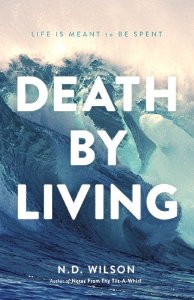 I had the pleasure of reading an advanced copy of this book (which comes out later this summer) and writing a review of it for Christianity Today. I can’t recommend it enough. Following and expanding upon themes in his Notes From the Tilt-a-Whirl, N.D. Wilson shows that he is not only one of his generation’s most gifted and original thinkers but also one of its best writers. Featuring some of the best prose you’ll see this side of Marilynne Robinson, Death by Living is a beautiful array of memoir, theological reflection and narrative vignette that oozes wonder about the world and humility before God. For college grads cynical about things like religion, purpose-driven lives and “making a difference”--and yet unwilling to abandon these notions entirely--Death by Living is the poolside reading I recommend.
I had the pleasure of reading an advanced copy of this book (which comes out later this summer) and writing a review of it for Christianity Today. I can’t recommend it enough. Following and expanding upon themes in his Notes From the Tilt-a-Whirl, N.D. Wilson shows that he is not only one of his generation’s most gifted and original thinkers but also one of its best writers. Featuring some of the best prose you’ll see this side of Marilynne Robinson, Death by Living is a beautiful array of memoir, theological reflection and narrative vignette that oozes wonder about the world and humility before God. For college grads cynical about things like religion, purpose-driven lives and “making a difference”--and yet unwilling to abandon these notions entirely--Death by Living is the poolside reading I recommend.
The End of Our Exploring (2013), by Matthew Lee Anderson
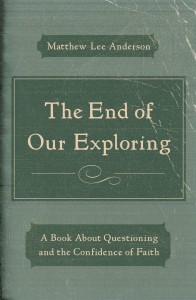 In a world where "dialogue" and "conversation" are buzzwords but rarely well practiced, and where doubt and questioning seem to be more about a scene than a search for truth, Matt’'s latest, The End of Our Exploring, comes as a breath of fresh air. Clearheaded, personal, witty and wise, the book presents a sensible framework for epistemology that is sorely needed today. How do we doubt, question, probe, debate, discuss and know in a more purposeful and productive manner? It's en vogue today for young Christians to put on airs of intellectualism (you know: tweed sport coats, pipes, Jacques Ellul reading groups...), but the image of thoughtfulness is not enough. Matt’s book--a short, concise, engaging read--reminds us that actually being thoughtful is far greater (and more nuanced) than just looking the part.
In a world where "dialogue" and "conversation" are buzzwords but rarely well practiced, and where doubt and questioning seem to be more about a scene than a search for truth, Matt’'s latest, The End of Our Exploring, comes as a breath of fresh air. Clearheaded, personal, witty and wise, the book presents a sensible framework for epistemology that is sorely needed today. How do we doubt, question, probe, debate, discuss and know in a more purposeful and productive manner? It's en vogue today for young Christians to put on airs of intellectualism (you know: tweed sport coats, pipes, Jacques Ellul reading groups...), but the image of thoughtfulness is not enough. Matt’s book--a short, concise, engaging read--reminds us that actually being thoughtful is far greater (and more nuanced) than just looking the part.
Brett McCracken is a Los Angeles-based journalist. He is the author of Hipster Christianity (2010) and Gray Matters (2013), and has written for the Wall Street Journal, the Washington Post, CNN.com, the Princeton Theological Review, Mediascape, Books & Culture, Christianity Today, Relevant, IMAGE Journal, Q Ideas, and Conversantlife.com. A graduate of Wheaton College and UCLA, Brett currently works as managing editor for Biola Magazine and teaches at Biola University. Follow him on Twitter @brettmccracken.